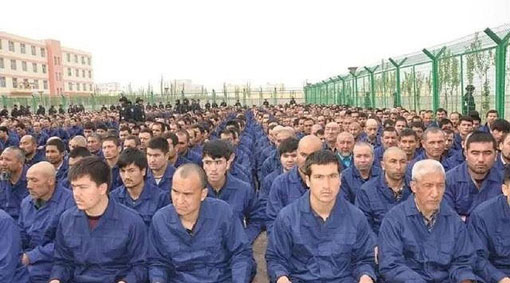by WorldTribune Staff, October 9, 2019
U.S. Secretary of State Mike Pompeo on Oct. 8 announced Visa restrictions on Chinese government and Communist Party officials who the State Department believes are “responsible for, or complicit in, the detention or abuse of Uighurs, Kazakhs, or other members of Muslim minority groups in Xinjiang, China.”
Reports from human rights groups and several media outlets have said that China is detaining at least one million Muslims in re-education prison camps in Xinjiang.

“The Chinese government has instituted a highly repressive campaign against Uighurs, ethnic Kazakhs, Kyrgyz, and other members of Muslim minority groups in the Xinjiang Uighur Autonomous Region that includes mass detentions in internment camps; pervasive, high-tech surveillance; draconian controls on expressions of cultural and religious identities; and coercion of individuals to return from abroad to an often perilous fate in China,” Pompeo said.
While State Department officials said U.S. law prevents them from announcing who was on the new visa restriction list, the South China Morning Post reported that “likely targets” include Chen Quanguo – a member of the 25-member Politburo and regional party secretary of the Xinjiang autonomous region.
Chinese Foreign Ministry spokesman Geng Shuang responded by saying the U.S. should stay out of China’s affairs and should immediately “correct its wrongdoing” in issuing the visa restrictions.
Communist China refers to the prison camps as “vocational training centers.”
A tweet from China’s embassy in the U.S. said: “Xinjiang affairs are purely China’s internal affairs that allow no foreign interference. We urge the US to correct its mistakes at once and stop its interference in China’s internal affairs.”
Pompeo said that the U.S. is calling on China “to immediately end its campaign of repression in Xinjiang, release all those arbitrarily detained, and cease efforts to coerce members of Chinese Muslim minority groups residing abroad to return to China to face an uncertain fate. The protection of human rights is of fundamental importance, and all countries must respect their human rights obligations and commitments. The United States will continue to review its authorities to respond to these abuses.”
The Chinese embassy said the measures taken in Xinjiang are aimed at eradicating radicalization and terrorism.
“They are in line with Chinese laws and international practices, and are supported by all 25 million people of various ethnic groups in Xinjiang,” China’s embassy said.
These new visa restrictions, Pompeo said, “complement” the Oct. 7 announcement by the Department of Commerce regarding the imposition of export restrictions on U.S. products exported to 28 entities, including elements of the Public Security Bureau and commercial companies in Xinjiang, involved in China’s campaign of surveillance, detention, and repression.
Washington said it was adding 20 local public security bureaus in Xinjiang and eight tech companies including Hikvision and Zhejiang Dahua Technology to an export blacklist in relation to surveillance, detention and repression in the far western region of China.
Those entities had been involved “in the implementation of China’s campaign of repression, mass arbitrary detention and high-technology surveillance against Uighurs, Kazakhs and other members of Muslim minority groups” in Xinjiang, the Commerce Department said.
Intelligence Brief __________ Replace The Media
